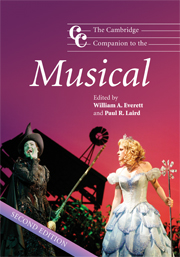Book contents
- Frontmatter
- Part I Adaptations and transformations: before 1940
- Part II Maturations and formulations: 1940–1970
- Part III Evolutions and integrations: after 1970
- 11 Stephen Sondheim and the musical of the outsider
- 12 Choreographers, directors and the fully integrated musical
- 13 From Hair to Rent: is ‘rock’ a four-letter word on Broadway?
- 14 The megamusical: the creation, internationalisation and impact of a genre
- 15 ‘Something borrowed, something blue’: the marriage of the musical and Europe
- 16 New horizons: the musical at the dawn of the twenty-first century
- Part IV Legacies and transformations
- Notes
- Select bibliography
- Index
15 - ‘Something borrowed, something blue’: the marriage of the musical and Europe
from Part III - Evolutions and integrations: after 1970
Published online by Cambridge University Press: 28 September 2011
- Frontmatter
- Part I Adaptations and transformations: before 1940
- Part II Maturations and formulations: 1940–1970
- Part III Evolutions and integrations: after 1970
- 11 Stephen Sondheim and the musical of the outsider
- 12 Choreographers, directors and the fully integrated musical
- 13 From Hair to Rent: is ‘rock’ a four-letter word on Broadway?
- 14 The megamusical: the creation, internationalisation and impact of a genre
- 15 ‘Something borrowed, something blue’: the marriage of the musical and Europe
- 16 New horizons: the musical at the dawn of the twenty-first century
- Part IV Legacies and transformations
- Notes
- Select bibliography
- Index
Summary
For those who embrace the musical as an American form – or at least as a product primarily of the English-speaking world – the phrase ‘European musical’ can seem an oxymoron. Although, as early chapters in this volume convey, the ‘musical’ is an amalgamation of an almost dizzying array of forms, many European or even African-influenced, as in minstrelsy, its maturity and ‘Golden Age’ were largely the result of American artists, audiences and society, and through the work of such writers as Stephen Sondheim, Jeanine Tesori, David Yaz beck and Adam Guettel, the musical remains a vibrant part of American culture, both on and off Broadway.
However, the musical is becoming increasingly international, particularly through the popularity of the ‘megamusical’, as Prece and Everett argue in the previous chapter. As the Music Theatre International website states: ‘The musical theatre is no longer the province of New York, London and the English speaking world – it is a truly multi-cultural phenomenon.’ This globalisation is certainly not unique to musical theatre; all forms of culture at the end of the twentieth and beginning of the twenty-first centuries are affected by the increasing interconnection of world societies and systems, an interdependency that has expanded exponentially during the past few decades through mediatised forms of communication, such as television, digital recordings, mobile phones, and perhaps most of all, the Internet. Critics of globalisation point to the breakdown of cultural specificity and nationhood; supporters applaud the levelling of world economic playing fields caused by technology.
- Type
- Chapter
- Information
- The Cambridge Companion to the Musical , pp. 270 - 283Publisher: Cambridge University PressPrint publication year: 2008



